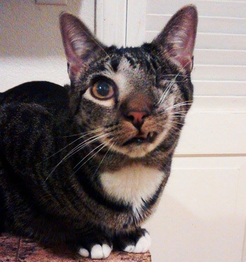
Their bodies may be imperfect, but their spirit remains intact.
So it is said about the special needs cat. Although caring for one can be challenging, more and more people are opening their hearts and their homes and adopting them. For this reason, more and more cats that might otherwise be euthanized are being given a new lease on life.
Experts stress the importance of not viewing special needs cats as “handicapped.” Although they have certain limitations (including blindness, deafness or a combination of both, cerebellar hypoplasia and three-leggedness), they’re not “aware” of them, and can be as active, affectionate and playful as any other cat.
Adopters of special needs cats insist that the rewards far outweigh the work. Many use social media to share their experiences, to interact with owners like them, and to encourage others to adopt. They don’t see their cats’ medical or physical problems as shortcomings, and don’t believe they make them any ”less” of a cat.
Those interested in adopting a special needs cat should first fully inform themselves about that cat’s condition and limitations, requirements and maintenance. This should also include meeting with their vet, requesting a tutorial on administering any necessary medications, and openly discussing any concerns they might have.
Sadly, cats who are blind or deaf (or both) have been characterized as aggressive and unpredictable, prone to other health issues, even a shorter life span. Studies, however, have proven otherwise, showing that despite their obvious deficiencies, these cats are generally quite healthy and capable of living long, otherwise normal lives. And that, whether blind or deaf, they are no more aggressive or unpredictable than sighted or hearing cats.
Blind cats are trained through the use of both sound and scent cues. By relying on their highly developed sense of smell, their noses let them know where and what things are, and when combined with their owner’s reassuring voice and touch, helps them live easily and comfortably.
They quickly learn and “map out” their surroundings, and for added protection, have a “go to” place, where their food and water bowls, cat bed and toys (squeakies, crinklies and ones with bells inside are best) are placed on a distinctive mat and never moved. A runner or large area rug provides them with a safe play area because the traction is good and the edges clearly discernible. Sharp edges on furniture can be padded with bubble-wrap or foam pipe insulation to help prevent injury.
Deaf cats, who sleep more and meow loudly (they can't hear themselves) watch their owners more closely, taking cues from their behavior. They also pay closer attention to vibrations and air currents, while their “internal clocks” let them know when it’s mealtime. Deaf cats can be trained by using hand signals or the beam of a flashlight with treats as reinforcement. And because they startle easily, if their attention is elsewhere, owners should always approach them by walking with a “heavy foot” to get their attention and avoid being accidentally nipped.
Cats with cerebellar hypoplasia will be wobbly and uncoordinated to varying degrees and have characteristic head tremors when they try to focus on something. At times it may seem as if they’re heading in two directions at once, but they DO adapt to these challenges. Given a safe environment and barring any accidents caused by their lack of coordination, they live as long as “normal” cats and barely seem bothered by their condition.
Tripods (cats born with a limb missing or amputated) can live long, healthy lives with minimal adjustments (from special ramps and stairs to new litter boxes) in order to compensate for that limb. And because cats are both ingenious (such as adapting to new ways of self-grooming) and nimble, the loss of a leg usually doesn’t stop them from enjoying life to the fullest.
As the owners of special needs cats agree, their own lives have been irrevocably changed. By the endearing personalities, grace and determination of the cats they have adopted. By the gift of their cats’ contented meows and purrs, licks and cuddles. But most importantly, by the example they have set and the inspiration they have provided.









 RSS Feed
RSS Feed